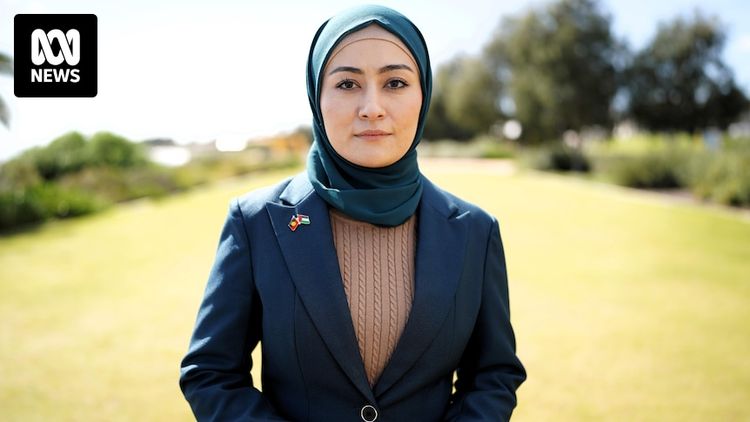Fatima Payman's new party may not be troubling Labor, but Anthony ...

After all the build-up, Fatima Payman's big reveal of her new political party has done little to trouble its main target: Labor.
The independent senator sandwiched the announcement of her party's name between the anniversary of the October 7 Hamas attack and the anniversary of the Voice referendum.
She's calling the party 'Australia's Voice' in an unsubtle attempt to scoop up supporters of the 'Yes' case in last year's referendum, along with those who sympathise with the senator's decision to quit Labor three months ago over its position on the war in Gaza.
Adopting that name went down like a lead balloon amongst those who spent years working on the concept of the Voice, holding unprecedented consultations with Indigenous Australians and then taking it, unsuccessfully, to a referendum.
"Surprising" was the reaction from Uluru dialogue co-chair Pat Anderson, who wasn't consulted.
"It could be very confusing," said Professor Tom Calma, one of Australia's most respected Indigenous rights campaigners. Others were more critical privately, calling it "exploitative", "disrespectful".
"The Voice is something that our leaders and communities have put decades and decades of work into," key Yes campaigner Marcus Stewart told the ABC.
"For the name now to be appropriated for political gain is deeply concerning and offensive and I'd call on the party to reconsider their name."
Senator Payman won't be doing that. "The word Voice isn't trade-marked per se," she told the ABC. The senator accepts "people are going to have objections", but makes no apology. "It's out there, people are loving it."
Senator Payman says she consulted with "First Nations people" about the name but won't reveal who they were.
Beyond the name, there's little substance to the party at this stage. Senator Payman is yet to choose candidates and is still working on policies.
At this stage, she's appealing to disaffected Labor voters who don't like AUKUS, want limits on negative gearing and more spending on schools, but feel the Greens are a bridge too far.
One thing the senator does not lack is confidence. Together with her adviser Glenn Druery, who's negotiated preference deals for minor and micro parties for two decades, there are grand plans to win Senate seats in every state.
Is Labor worried? "Not. At. All," said one cabinet minister.
"It will go as well as the Glenn Lazarus Team, the Rex Patrick Team and the Bullet Train for Australia party," predicted one ALP official.
Plenty of other headaches to worry aboutA more crowded field on Labor's Left flank appears to be a lesser concern for the government right now than the pressure being brought to bear by Peter Dutton on the Right.
A Resolve poll published in the Nine newspapers this week revealed the difficultly facing the government. It showed a clear majority of those surveyed didn't support Australia backing one side over another when it comes to the conflict in the Middle East.
Most Australians aren't cheering on either Israel or Hamas. This would seem to align with Labor's efforts to hold a middle-ground position.
And yet the same poll showed marginally more support for Peter Dutton's response to the conflict than Anthony Albanese's.
This may not be a top order issue for most voters, but they are narrowly favouring the opposition leader's decisive and robust pro-Israel line to the prime minister's more nuanced centrist approach, which is upsetting both sides of the argument.
Albanese continued to tread that careful line yesterday. "We support Israel's right to defend itself," he told Sky News, stopping short of agreeing this included a "right to respond" to Hezbollah and Iran, as his ministers Richard Marles and Mark Butler said this week.
Albanese insists he's completely in line with US President Joe Biden, the British Prime Minister Keir Starmer and other G7 leaders who have called for "all parties to engage constructively to de-escalate the current tensions".
He doesn't mention Biden has also said "the Israelis have every right to respond to the vicious attacks on them".
Between now and next year's election, Labor hopes to build a case that both the Coalition and the Greens represent the extremes.
Whether it's on the Middle East, housing policy, environmental laws, or the "Future Made in Australia" legislation, Labor wants to be seen as representing the sensible centre.
That's the aim. The danger is the government looks unable to convince parliament to back its agenda.
The view on the Coalition side is that the prime minister is looking increasingly "rattled". His snap at the shadow treasurer during Question Time this week, when he used a derogatory line about "Tourette's", was a case in point.
Albanese, to his credit, withdrew and apologised twice for the offensive remark.
The Coalition saw another sign of the government being under pressure in yesterday's attempt to drum up an argument over "protecting" the National Broadband Network from being privatised. Liberals called it a desperate political stunt.
After today, there are only three parliamentary sitting weeks before the end of the year. That leaves little time to pass legislation, introduce new bills on gambling ads and social media age limits, and most importantly, take control of the agenda.
Fatima Payman's new party may not be troubling Labor, but it still has plenty of other headaches to worry about.
David Speers is national political lead and host of Insiders, which airs on ABC TV at 9am on Sunday or on iview.



































